In this article:
Indian lilac, commonly known as neem, is a popular evergreen tree that grows up to 50 feet high. (1) Scientifically named Azadirachta indica, neem tree belongs to the Meliaceae or mahogany family. Neem is indigenous to the Indian subcontinent, but it can also be found in the Middle East.
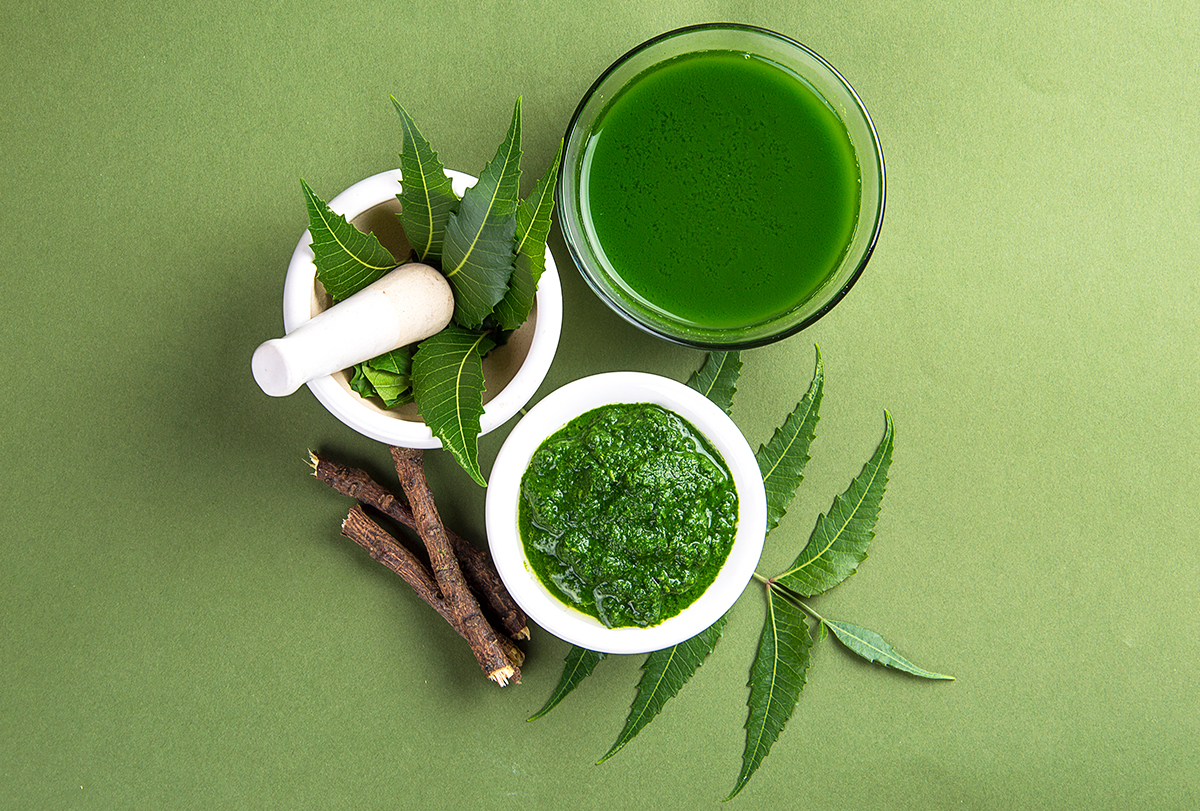
Neem is highly popular as a medicinal plant. Its leaves and leaf extracts are commonly used for their antiseptic, anti-inflammatory, antioxidant, and healing properties. The seeds, bark, roots, and neem oil extracts are also used for different medicinal and beauty purposes.
Neem is used in the treatment of eczema, acne, psoriasis, blackheads, and pigmentation, among others. (2) Neem leaves can also improve the health of your skin and hair; that is why they are a common ingredient in soaps, lotions, shampoos, and creams.
8 Benefits of Neem for Skin
Neem is rich in antioxidants, anti-inflammatory agents, vitamins, minerals, and fatty acids that provide deep nourishment to the skin and consequently ward off common cosmetic problems. Moreover, neem acts as an antibacterial agent that also soothes the skin.
What’s more, neem products are suitable for all skin types, namely, normal, oily, dry, combination, or sensitive.
Precaution: Neem is generally safe to use, but it is best to conduct a patch test before full-scale application to check for allergies. Moreover, do not consume neem oil as it is toxic.
You can use neem as a part of your skin care routine for the following benefits.
1. Treats acne

Neem leaves are highly useful in controlling oil production in the skin and can therefore be useful in the treatment and prevention of acne. Additionally, the antibacterial properties of neem fight acne-causing bacteria, thus reducing acne flares. (3)
How to use:
- For spot treatment, apply neem oil to your acne or pimples.
- For daily use, mix neem oil with water or other carrier oils such as rosehip oil or jojoba oil to make a face oil. Apply this face oil to your face every day before bedtime.
- You can also mix neem leaves with orange peel and water and boil. Once the leaves soften, sieve them out and grind them into a paste. Mix the paste with lemon juice and honey. Apply the mixture to your face and wash it off once dry. Repeat this remedy 1–2 times a week.
2. Cleanses and shrinks pores
The use of neem on your face can help cleanse your skin pores and tighten them. This, in turn, helps in the management of blackheads and whiteheads.
How to use:
- Mix 1 tsp of neem bark paste with 2 pinches of turmeric. Apply the paste to your neck and face, and wash it off after 5–10 minutes.
- Dry some neem leaves and grind them into a fine powder. Add a few drops of rosewater to the neem powder to form a paste. Apply the paste to your neck and face, and wash it off after 15 minutes.
3. Moisturizes skin
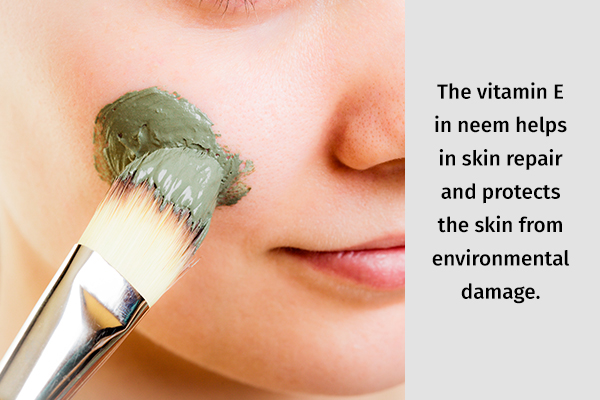
Neem is rich in vitamins and fatty acids that nourish, condition, and moisturize the skin. Using neem can relieve skin dryness without making the skin oily.
In addition, the vitamin E in neem helps in skin repair and protects the skin from environmental damage. These properties of neem, in the long term, can make your skin clear and youthful.
How to use:
- Mix a few drops of grape seed oil with 1 tbsp of neem powder to form a paste. Apply it to your face, and wash it off after 20 minutes.
- Mix mashed papaya with neem powder, and apply the paste to your face. Wash it off with cold water after 30 minutes.
4. Fades under-eye dark circles
It is common to develop dark circles under the eyes, often due to fatigue. Neem can be beneficial in fading these dark circles owing to its antioxidant and moisturizing properties. The antioxidants improve the skin pigmentation, (4) giving your skin an even skin tone.
How to use:
- Make a paste by combining neem powder with water and a few drops of sweet almond oil. Apply the paste around the eyes, and wash it off after 15 minutes. Repeat this remedy once a day.
- Use neem oil diluted with olive oil to massage the skin around your eyes at least 2–3 times a week.
5. Fights signs of aging
Skin aging is a natural phenomenon that causes skin sagging, fine lines, and wrinkles. However, these aging signs may also appear in young individuals, known as premature aging, due to constant exposure to UV rays.
Therefore, it is vital to take care of your skin from a young age to prevent or delay skin aging. You can use neem powder for the same, as its abundant nutrients and antioxidants exhibit antiaging effects.
Applying neem to your face can tighten and tone your skin. (5) Using oatmeal with neem exfoliates and nourishes your skin. Similarly, milk and honey soften and moisturize the skin.
How to use:
- Mix ½ cup of oatmeal with 2 tbsp of milk, 2 tsp of neem paste or powder, and 1 tsp of honey. Apply the mixture to your face and scrub in circular motions for a few seconds. Wash your face using cold water once dry.
- Boil neem leaves in 2 cups of water until the liquid reduces to half and sieve the mixture. Use this neem-infused water to wash your face two times daily.
6. Soothes skin

As mentioned above, neem has antibacterial and anti-inflammatory properties (6) that can soothe irritated skin. Neem also has a cooling effect on the skin, which can be beneficial for treating skin sensitivity.
In addition, the moisturizing properties of neem have a soothing effect on dehydrated or dry skin. Cleansing your skin with mild neem soap or dabbing the area with neem tea (soak neem tea bags in water and use it) can help you get rid of the irritation.
How to use:
- Use neem soaps to cleanse your skin daily.
- Using a cotton ball, dab some neem tea on the affected area.
- Make a paste by combining neem powder and aloe vera gel, and apply it to the cleansed skin. Massage in the paste, and wash it off after 15 minutes.
- Dilute neem oil with coconut oil, and use the oil blend to gently massage the irritated skin. Wash off the oil with lukewarm water after 45 minutes.
7. Treats wounds and scars
Neem has been shown to aid in wound healing and prevent scar formation. Its antiseptic properties prevent infections, and its rich fatty acids can boost wound healing and support skin health.
How to use:
- Apply neem oil to your scars or wounds daily.
- Boil 15–20 neem leaves in one cup of water, and use this neem tea to wash the affected areas.
8. Prevents skin infections
As mentioned above, the antibacterial and antimicrobial properties of neem help control the growth of infection-causing microbes. This is why neem is often used in the treatment of athlete’s foot and other skin infections. (7)
Neem can also help treat the skin redness, inflammation, dryness, and itchiness associated with different bacterial or fungal infections.
How to use:
Dilute 1 tsp of neem oil with 1 tbsp of olive oil. Use the oil blend to massage your feet or other affected areas before bedtime. Repeat this remedy daily.
4 Benefits of Neem for Hair
The antimicrobial and immune-boosting properties of neem can benefit not only your skin but also your hair, making it soft and lustrous. Neem can improve your hair health in the following ways.
1. Relieves itchy scalp and dandruff
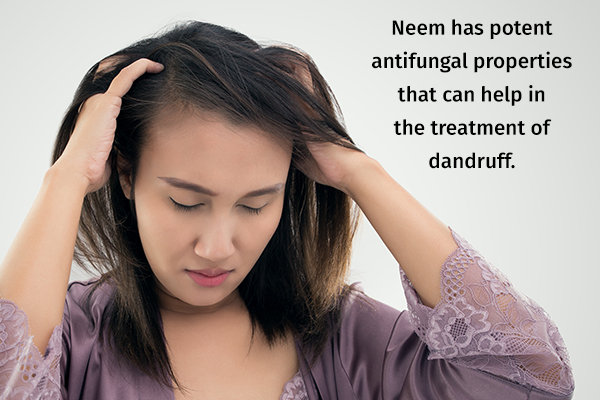
Dandruff is generally caused by an infection of the fungi Candida and Malassezia. Since neem has potent antifungal properties, it can help in the treatment of dandruff. (8)
Moreover, applying neem to your hair can relieve the itchiness, inflammation, and irritation associate with dandruff. In addition to this, neem oil helps balance the pH of the scalp, thus preventing dandruff formation in the first place.
How to use:
- Boil a few neem leaves with coconut oil and add a few drops of lemon to it. Massage this oil in your scalp before bedtime, and wash it off in the morning using a mild shampoo.
- Mix 2 tbsp of neem powder with 2 tbsp of yogurt to form a thick paste. Apply this paste to your scalp, and rinse it off after 15–20 minutes. The soothing and cooling properties of yogurt give an added benefit in dandruff treatment.
2. Boosts hair growth and prevents hair loss
Hair roots are largely affected by the health of the hair follicles or scalp pores. If you have oily hair, that is, excessive sebum production in the scalp, your scalp pores may get clogged. This, in turn, may lead to inflammation that weakens the hair roots, often leading to hair fall.
Neem water cleanses the pores, controls oil production, and also improves the health of hair follicles, thus preventing hair fall. Moreover, it supports healthy cell division and follicular function, which boost hair growth.
In addition, neem can help control hair fall caused by pollution, medications, stress, and scalp problems such as psoriasis, owing to its soothing, antibiotic, anti-inflammatory, and antioxidant properties.
How to use:
- Mix neem oil and sweet almond oil in equal amounts, and massage your scalp with this oil blend. Rinse your scalp with water after 1–2 hours.
- Make a grainy paste by mixing neem powder and water, and apply it to your scalp. Rinse with cold water after 30 minutes.
3. Reverses hair damage
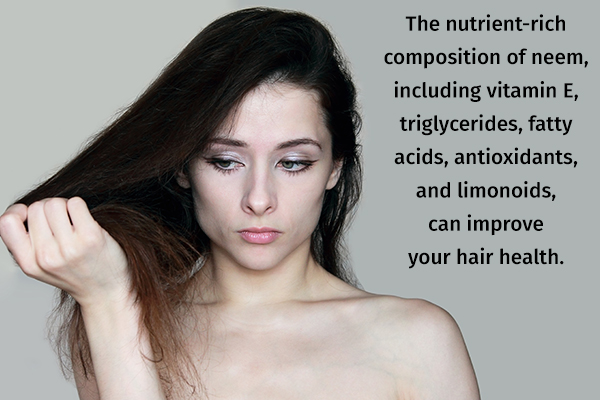
Hair fall is generally a result of hair damage, which includes split ends, hair dryness, and hair breakage. The damage is generally caused by exposure to pollution, sunlight, chemicals, and heat.
The nutrient-rich composition of neem, including vitamin E, triglycerides, fatty acids, antioxidants, and limonoids, can improve your hair health. It also provides hydration and moisturization, which are essential in improving general hair health.
How to use:
Boil around 40 neem leaves in water and let it sit overnight. The next day, grind the leaves to a fine paste, and add in 1 tsp of honey. Apply this solution to your hair, and wash it off after 30 minutes.
4. Prevents premature graying of hair
Neem is rich in antioxidants that curb the action of free radicals that cause premature graying of hair. You can regularly use neem powder or neem oil for the same.
Note: This remedy cannot reverse graying and can only prevent further hair graying.
General Queries
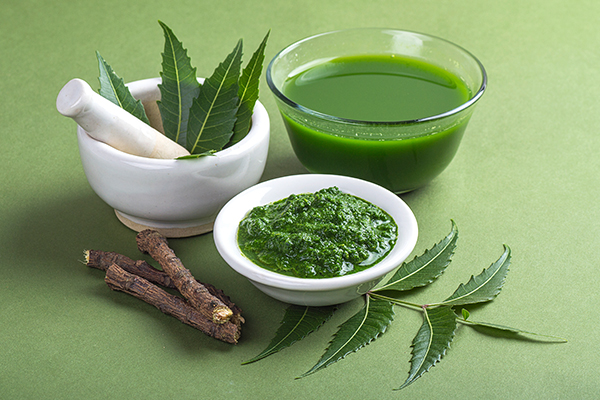
Can you consume neem water daily?
Neem water can be consumed daily for its different health benefits. Drinking neem water daily can help clear your skin of bacteria, toxins, acne, and pigmentation.
Can neem be used for the treatment of head lice?
Neem is commonly used for the treatment of head lice for a long time. In fact, neem has been shown to kill lice and lice eggs in various studies. (9)(10) For this reason, neem is a common ingredient in different lice medications.
You can also heat neem oil and apply it to your scalp. Wash your head after an hour to get rid of lice.
Final Word
Neem and neem oil are popular for their wide variety of beauty uses, including treatment for acne, fine lines, dandruff, wrinkles, blackheads, and skin pigmentation.
Neem can also strengthen your hair and boost hair growth. It can nourish and hydrate your hair and skin and can restore the skin’s pH balance. You can use neem leaves, neem powder, or neem oil to treat different issues related to the hair and skin or to simply improve their health in general.
- Was this article helpful?
- YES, THANKS!NOT REALLY


